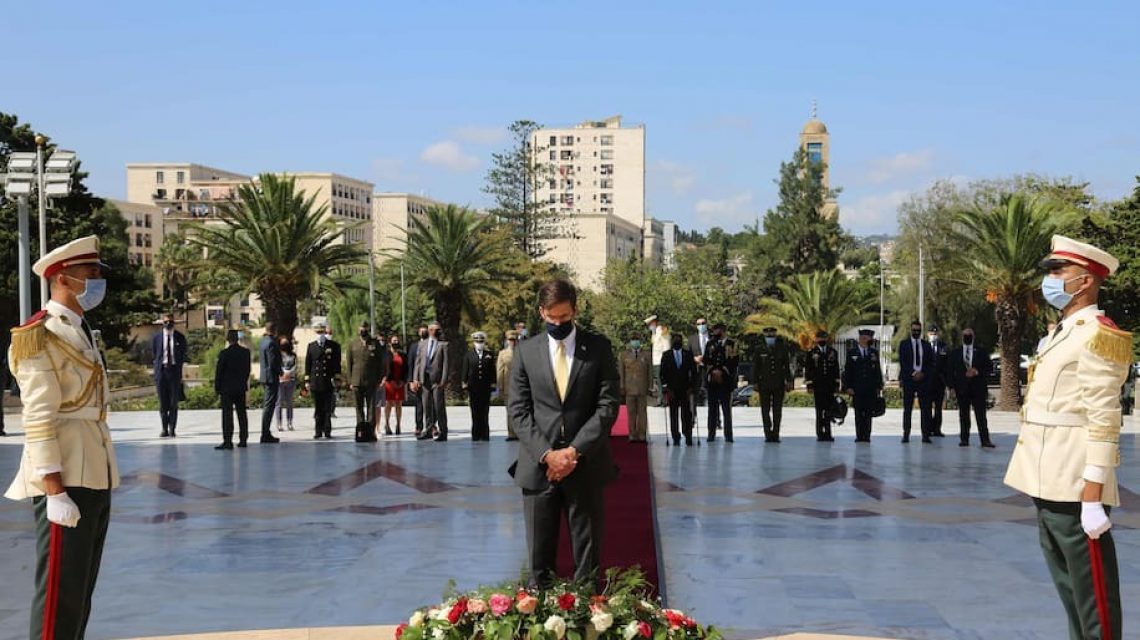The US Defence Secretary’s regional tour in the Maghreb from 30 September to 3 October followed up on the most recent interoperability training mission with Morocco and Tunisia, which suggests the US Africa Command (AFRICOM) as a driving force behind Washington’s renewed commitment to regional partners. The latest military exercise showed how the US Department of Defence (DoD) was able to pinpoint its strategic interests in the region, while the most recent diplomatic push anchored them to a long-term perspective. Indeed, Mark Esper’s visit to Rabat and Tunis resulted in the signature of two defence cooperation roadmaps, that will reinforce partnership and interoperability for the next ten years.
Compared with case of Morocco and Tunisia, both designated as Major Non-NATO Allies (MNNA), the visit to Algeria has been exceptional to some extent. Esper was the first US Defence Secretary to visit Algiers since 2006. Meeting with President and Defence Minister Abdelmajid Tebboune, Esper praised Algeria’s contribution to the stability of the region and discussed ways to improve military cooperation in different areas. Also in this case AFRICOM acted as a precursor, as on the 23rd of September Gen. Stephen Townsend, AFRICOM commander, had visited Algiers, meeting with Tebboune, the Foreign Minister Sabri Boukadoum and Lt.-Gen. Saïd Chengriha, chief of staff of the Algerian army.
From the US viewpoint, improving military cooperation with Algeria would certainly serve Washington’s strategic interests in a changing regional landscape, where some recent setbacks made the Pentagon nervous. There are reasons to believe that the US diplomatic push was also welcomed by Algerian officials looking to consolidate legitimacy at home and abroad. Warming relations with the West represents a priority and, being part of NATO’s Mediterranean Dialogue, increasingly useful. In this context, it is worth noting that on 12-14 September the flagship of the Standing NATO Maritime Group Two (SNMG2), the Spanish air defence frigate Alvaro de Bazán (F-100, Bazán class), was in Algiers for a visit to strengthen partnership and discuss common threats. The vessel also took part to a training programme with the el-Moudamir, a MEKO-A 200AN (el-Radii class) frigate of the Algerian navy, proceeding at passing exercises, as well as communications and manoeuvre drills.
However, the US diplomatic offensive faces some serious structural challenges, the first and foremost is which side would Algeria take in the great power competition ongoing in the Mediterranean Basin. Just a few days before Esper’s visit, the Russian Director of the Federal Service for Military-Technical cooperation Dmitry Shugaev was in Algeria, a timely reminder of the historic ties between Algiers and Moscow, military partners par excellence in Africa.
Another important hurdle is the very nature of the Algerian regime, that is still struggling to consolidate its power. The upcoming constitutional referendum on 1st November has drawn attention in Washington, particularly sympathetic to provisions that would allow the deployment of the units of the Algerian army abroad for peacekeeping missions. However, the reform has opened new fronts in the Algerian pouvoir and deepened rifts with the Hirak opposition movement at the same time. It has frustrated high-ranking military officers, reluctant to overturn a consolidated military doctrine based on non-interventionism; and it is judged cosmetic by activists and protesters, that are still asking for real change, while being harshly repressed.


















